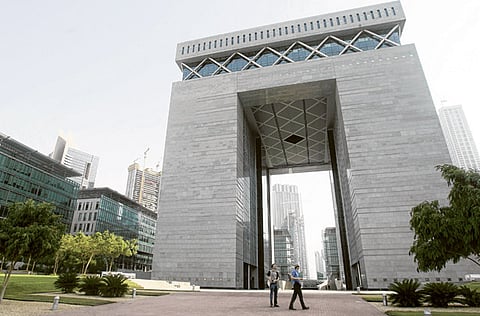DIFC functions streamlined
Mohammad amends law to improve clarity, efficiency and governance

Dubai: A series of amendments to laws relating to the Dubai International Financial Centre (DIFC) were announced yesterday.
His Highness Shaikh Mohammad Bin Rashid Al Maktoum, Vice-President and Prime Minister of the UAE and Ruler of Dubai, has issued Law No 7 of 2011 which includes amendments to a number of articles in Law No 9 of 2004 (Original Law) that established the DIFC.
The amendments provide greater legal clarity and transparency to the operations of various DIFC bodies, according to leading bankers and financial experts.
"The amendments to Law No 9 provide greater legal clarity and improve the corporate governance of DIFC. These changes further strengthen DIFC's legal and financial infrastructure as a whole, and reinforce the Government's commitment to the independence of each of the Centre's bodies," said Ahmad Humaid Al Tayer, Governor of DIFC.
Law No 7 of 2011 was enacted on April 4, and published on April 21 in the Official Gazette in both Arabic and English.
Following the Dubai Government's review of governance structures, the new law provides for the creation of a Higher Board comprising representatives of the three DIFC bodies — DIFC Authority, the Dubai Financial Services Authority and DIFC Courts..
This board will be presided over by the DIFC President, Shaikh Maktoum Bin Mohammad Bin Rashid Al Maktoum, Deputy Ruler of Dubai, and will be invited to meet at least twice a year.
The DIFC Higher Board will ensure that the three DIFC bodies operate in harmony without affecting one another's independence. Financial experts said yesterday the smooth functioning of these three bodies key to achieving the goals of DIFC as an aspiring global financial centre
"This is an important step forward in the growth of DIFC as a global financial centre," said Al Tayer.
Changes to the Original Law include a number of provisions that are specific to DIFCA. These confirm DIFCA's independence and put into place a corporate structure of a board, CEO and executive body.
Provisions of the new law also clarifies that DIFCA is now responsible for establishing, regulating and developing the centre's payment systems. DIFCA will coordinate with the Central Bank of the UAE in regulating, supervising, operating and using wholesale, large-value payment systems, including a multi-country, multi-currency Real Time Gross Settlement System, allowing the clearing and settlement of payments in foreign currencies in the DIFC.
Assurance
"By emphasising the centre's independence, the new law assures companies looking to establish a presence in the region that DIFC offers both a modern infrastructure and a world-class business environment," Said David Eldon, chairman of DIFCA.
A DFSA-related article in the new law clarifies the roles and powers of the DFSA's board and CEO, reinforcing the autonomy and authority of the DFSA's board. "DFSA welcomes the new law as a further positive step in the development of the centre. DFSA will continue its commitment to protect the integrity of DIFC and to realise the vision its President," said Abdullah M Saleh, chairman of the DFSA board of directors.



